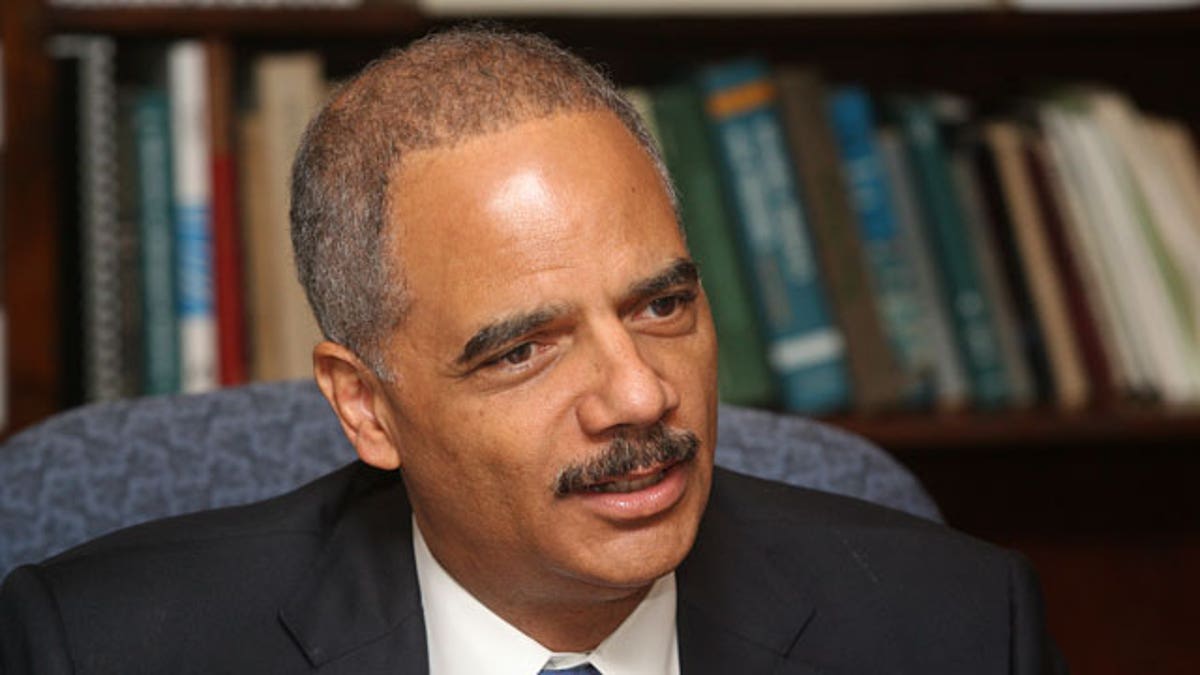
Attorney General Eric Holder talks with local businessmen Thursday, June 30, 2011 at the Alabama Department of Marine Resources & Conservation on Dauphin Island, Ala.
The Justice Department's decision to launch a full criminal investigation into the deaths of two detainees while in CIA custody and drop about 100 other cases of alleged misconduct by the spy agency has drawn mixed reviews from conservatives and liberals alike.
Conservatives, who have been pressuring Attorney General Eric Holder to abandon the two-year preliminary review into interrogations by the Bush administration after the Sept. 11 terrorist attacks, were pleased that most cases were being dismissed, but they still expressed concern about the two that remained.
Sen. Chuck Grassley, the top Republican on the Senate Judiciary Committee, said that Holder should offer reassurance to members of the intelligence community involved in the two cases that they won't be prosecuted if they relied on the legal advice of the Justice Department – as Holder did when he first launched the review in 2009.
"I'm glad the Justice Department has called off the broad investigation, but I will keep an eye on the remaining two cases to makes sure they progress only if there is credible evidence," Grassley said. "Perhaps now our intelligence professionals in the field can stop looking over their shoulders, and the attorney general will quit armchair-quarterbacking from Washington, D.C., intelligence decisions in the field."
Rep. Mike Rogers, R-Mich., chairman of the House intelligence committee, called Holder's decision a "significant step forward" for intelligence professionals and expressed hope that he "will not prosecute anyone who acted in good faith and within the scope of legal advice."
"I hope that this decision will allow our intelligence professionals to move forward with their critical work free from the chilling effect of further investigation, and with the deserved full confidence of the American people," he said.
But liberal groups, while happy about the probe of two cases, were left wanting more.
"While we welcome the announcement that the Justice Department will conduct a full criminal investigation into the deaths of two prisoners in CIA custody, it is difficult to understand the prosecutor's conclusion that only those two deaths warrant further investigation," said Jameel Jaffer, deputy legal director at the ACLU.
The Bill of Rights Defense Committee also decried Holder's decision.
"The Justice Department's announcement of only two CIA prosecutions, despite nearly a decade of using torture as state policy, is a national travesty on par with the Japanese internment," Shadid Buttar, executive director of the group, said. "Excusing from investigation officials who tortured 'in good faith' violates international law, abandons the Nuremberg precedent that we fought a world war to establish and creates a separate system of justice for government officials who commit criminal acts, all in one fell swoop."
Holder did not identify the two death cases that will be investigated further. But former and current U.S. officials who requested anonymity to discuss an ongoing investigation said Durham was looking at the deaths of Gul Rahman and Manadel al-Jamadi.
Rahman died in the early hours of Nov. 20, 2002, after being shackled to a cold cement wall in a secret CIA prison in northern Kabul, Afghanistan, known as the Salt Pit. He was suspected of links to the terrorist group Al Qaeda.
Al-Jamadi died in 2003 at the Abu Ghraib prison in Iraq. The death has been known to the public for years and a military autopsy declared al-Jamadi's death a homicide.
Prosecutor John Durham conducted the two-year review of 101 cases, Holder said. Holder said the review looked mostly at "whether any unauthorized interrogation techniques were used by CIA interrogators, and if so, whether such techniques could constitute violations of the torture statute or any other applicable statute."
The investigation into CIA practices, first announced in August 2009, outraged some lawmakers concerned about the precedent the Obama administration could set by investigating the war-time actions of its predecessor. Republican lawmakers revived calls to drop the probe altogether after Usama bin Laden was killed in a CIA-led raid in Pakistan, claiming Bush-era interrogations played a part in tracking him down.
Leading analysts say the endless scrutiny and threat of litigation that hung over the heads of CIA interrogators could make the intelligence community more risk-averse in the future -- at time when they need to take even more risks because the threat has become more diversified, spreading to Al Qaeda franchises in Yemen, Somalia and the homegrown component.
"We want our national security and counterterrorism professionals not to be looking behind their shoulder wondering whether the next administration is going to second-guess their moves that were authorized by law," said Charles "Cully" Stimson, a senior legal fellow at the conservative Heritage Foundation.
On his last day as CIA director, Leon Panetta pledged CIA cooperation with the investigations.
"I welcome the news that the broader inquiries are behind us," he said. "We are now finally about to close this chapter of our agency's history."
Panetta added that "both cases were previously reviewed by career federal prosecutors who subsequently declined prosecution."
The Rev. Richard Killmer, executive director of the National Religious Campaign Against Torture, who praised Holder for investigating the two deaths, said that a commission of inquiry should be established for a broader investigation and recommendations for safeguards to end what he called U.S.-sponsored torture.
"We have a moral obligation to fully investigate our government's past use of torture," he said. "Only by fully understanding the mistakes that were made can we ensure that we do not make them again."












































